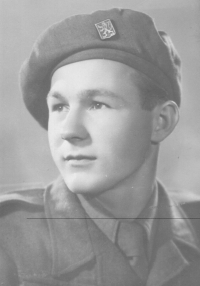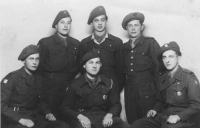They threatened their mother that she would lose her widow’s pension unless we get Germanized

Download image
Alois Kuznicius was born on August 13, 1923 in Rychvald near the Czech-Polish border. His father was a social democrat, an employee of Czechoslovak Railways, his mother had five general classes and was a housewife. In 1934, when Alois was 11 years old, his father lost his life at the railway station in Bohumín. He left four children behind; Alois, his two brothers and a sister. In 1942, under the threat of losing widow’s pension, the Nazis forced the mother to register herself and her minor children on the so-called Volkslist, and since then they have had the status of German citizens. Alois was totally deployed at the shaft in Lazy from the age of 17, and in October 1943 he had to enlist in the Wehrmacht. In France, he trained with a German infantry army specially trained for combat in mountain terrain, with the so-called mountain hunters. A year later, after the Allies landed in Normandy, he voluntarily surrendered to American captivity. As a prisoner, he went to Italy, where he enlisted as an adept in the Czechoslovak army. He was then transferred to Algeria, where the motive for his service in the Wehrmacht was examined. In December 1944, he took an oath in England, received a uniform and underwent artillery training. From January 1945 until the end of the war he fought at Dunkirk. After returning to his homeland, he served in the army until April 1946. He worked as a line worker for a while, but he wanted to get married, so he went to work in the mines to receive a better salary. The Communists did not recognize his title as a foreign soldier and reduced his pension due to serving in the German army. The correction and compensation took place only after the change of politics following 1989, when he also joined the Czech Union of Freedom Fighters. He was never a member of the Communist Party.

